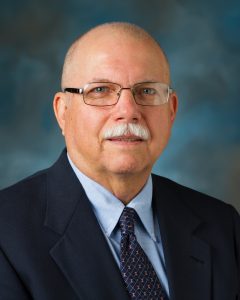It’s been years since University of Florida Professor Emeritus George Hochmuth set foot inside a classroom, yet students from all over the world still benefit from his lessons every day. As the architect of Coursera’s Sustainable Agricultural Land Management course, Hochmuth has attracted more than 45,000 enrollees.

Coursera recorded video of Hochmuth delivering the beginner course in 2013, back when he worked as a professor of plant nutrition and soil fertility for the UF/IFAS department of soil, water and ecosystem sciences.
“The material is still current, and it still attracts a fair number of subscribers,” Hochmuth said. “I get about 150 to 200 new students weekly. It’s a popular course.”
Hochmuth drew from 40 years of teaching sustainable agriculture and urban land management to create his 19-hour lesson plan. Although most of the images and information he presents reflect his work in Florida, the material is applicable to anyone — no matter where they live.
The main theme is ensuring agricultural operations run in an environmentally sustainable manner, particularly in relation to water and nutrients. Topics divided across eight modules include where water is scarce and why; nutrient demands and how to meet them; soil testing; fertilization; and the application of water and nutrients to avoid leaching nutrients from the soil.
“The 30,000-foot level, take-home lesson is, you have to carefully manage the inputs, so you get the desirable crop production, but you also do so to avoid any detriment to the environment,” Hochmuth said.
The fact that enrollment is free and continually available to anyone with an internet connection means the material is easily accessible. Students who desire a certificate pay a nominal fee to Coursera. They must complete a project that applies what they learned to a real or theoretical farm operation.
Although Hochmuth’s interactions with his students are limited, he said most are future farmers who want to establish best management practices before they set up agriculture operations or current farmers who seek to improve their current operations.
“The thing that ties them all together, all the students, would be their interest in sustainability principles and practices for agriculture operations, whether they work on a small farm or a large farm,” he said.
And based on how students have rated the course – 4.8 out of 5 stars based on 547 responses – most appreciate Hochmuth’s message.
“As someone pivoting into the realm of sustainability, this course informed and affirmed my decision to pursue a role in aiding both farming communities and the environment by focusing on land management,” wrote Bec S., a student verified as having completed the course. “While it was plenty informative, I feel I’ve been given much to delve further into from here.”
###
ABOUT UF/IFAS
The mission of the University of Florida Institute of Food and Agricultural Sciences (UF/IFAS) is to develop knowledge relevant to agricultural, human and natural resources and to make that knowledge available to sustain and enhance the quality of human life. With more than a dozen research facilities, 67 county Extension offices, and award-winning students and faculty in the UF College of Agricultural and Life Sciences, UF/IFAS brings science-based solutions to the state’s agricultural and natural resources industries, and all Florida residents.
 0
0
